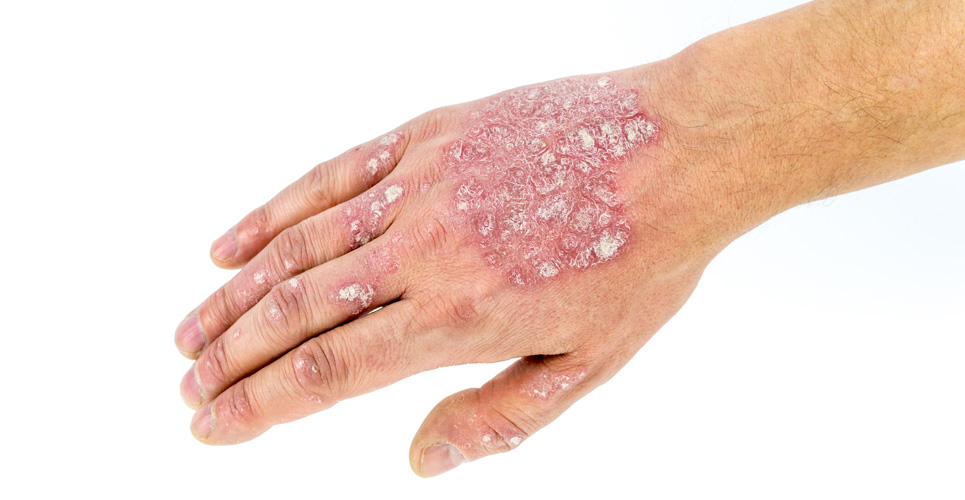The Janssen Pharmaceutical Companies of Johnson & Johnson has announced that the UK’s National Institute for Health and Care Excellence (NICE) has issued its Final Appraisal Determination (FAD) recommending Tremfya® (guselkumab) for treatment of adults with moderate to severe plaque psoriasis.1
The NICE recommendation states that guselkumab is recommended as an option for treating plaque psoriasis in adults, only if:
The Janssen Pharmaceutical Companies of Johnson & Johnson has announced that the UK’s National Institute for Health and Care Excellence (NICE) has issued its Final Appraisal Determination (FAD) recommending Tremfya® (guselkumab) for treatment of adults with moderate to severe plaque psoriasis.1
The NICE recommendation states that guselkumab is recommended as an option for treating plaque psoriasis in adults, only if:
- the disease is severe, as defined by a total Psoriasis Area and Severity Index (PASI) of 10 or more and a Dermatology Life Quality Index (DLQI) of more than 10i and
- the disease has not responded to other systemic therapies, including ciclosporin, methotrexate and PUVA (psoralen and long-wave ultraviolet A radiation), or these options are contraindicated or not tolerated and
- the company provides the drug with the discount agreed in the patient access scheme.
As part of the Fast Track Appraisal procedure, NICE issued a FAD rather than an Appraisal Consultation Document (ACD), speeding up the process by which eligible patients will be able to access guselkumab.
Affecting approximately 14 million people across Europe,2 psoriasis can have a considerable impact on physical and psychological well-being, with approximately one third of patients experiencing depression and anxiety.3 Due to the visible nature of the disease, psoriasis can lead to social isolation, due to self-consciousness and low self-esteem.4
Guselkumab is the first biologic to selectively target interleukin (IL)-23, a key protein that initiates a specific immune inflammatory response in psoriasis.5-7 Guselkumab can offer patients both effective and sustained control of this debilitating disease, with evidence showing superior efficacy compared with a biologic standard of care.5-8 It is indicated for the treatment of moderate to severe plaque psoriasis in adults who are candidates for systemic therapy.9
“Psoriasis is a serious long-term condition with important comorbidities that can impact patients’ daily lives” said Professor Chris Griffiths, Foundation Professor of Dermatology at The University of Manchester, UK and VOYAGE 1 study Steering Committee member. “Guselkumab provides a significant and welcome advance in our management of psoriasis with a high percentage of patients achieving clear or nearly clear skin over the long-term”.
The NICE FAD was fast-tracked following European Commission approval in November 2017, based on data from Phase III clinical studies. The VOYAGE 1 and 2 trials, which compared guselkumab with placebo and Humira® (adalimumab), showed high levels of skin clearance after 16 weeks, with a PASI 90 score in 73.3% and 70.0% of patients receiving guselkumab, compared with 49.7% and 46.8% in patients receiving adalimumab, respectively (P<0.001).5,6 Longer term data also demonstrated consistent rates of skin clearance in patients with moderate to severe psoriasis treated with guselkumab through week 100.10
Jennifer Lee, Director of Health Economics, Market Access and Reimbursement (HEMAR) and Advocacy, Janssen-Cilag Ltd commented on the NICE approval saying, “We are delighted that NICE is recommending guselkumab be made available to patients in the UK. Patients with moderate to severe plaque psoriasis may now benefit from this new treatment option, which has been shown to have a clinically meaningful effect on their disease. At Janssen, we remain committed to developing innovative therapies to improve the lives of those living with these debilitating diseases.”
During the clinical development programme for guselkumab in psoriasis there were no signals of increased risk of malignancy, major cardiovascular events or serious infections.5-7 Guselkumab may increase the risk of infection.10 Adverse events reported in at least 5% of guselkumab-treated patients during the first 16 weeks in the VOYAGE 1 and 2 trials included: nasopharyngitis, upper respiratory tract infection, injection site erythema, headache, arthralgia, pruritus and back pain. The types of adverse events reported remained generally consistent through 48 weeks of treatment.5,6
Guselkumab is an injectable treatment for psoriasis and can be self-administered following training. Treatment requires two starter doses, one initially and the other four weeks later, followed by a maintenance dose once every eight weeks (q8w) thereafter.7-9
References
- National Institute of Health and Care Excellence (NICE). Psoriasis (moderate, severe) – guselkumab [ID1075]. Available at: www.nice.org.uk/guidance/indevelopment/gid-ta10232/documents. Last accessed May 2018.
- Ortonne J.P and Prinz J.C. (2004) Alefacept: a novel and selective biologic agent for the treatment of chronic plaque psoriasis. Europ J Dermatol. 14:41–5.
- Mental Health Foundation. See psoriasis: look deeper report. Available at: www.mentalhealth.org.uk/file/1113/download?token=Jrx9KmOE. Last accessed May 2018.
- World Health Organization (2016) Global Report on Psoriasis. Available at: apps.who.int/iris/bitstream/10665/204417/1/9789241565189_eng.pdf. Last accessed May 2018.
- Blauvelt, A. et al. (2017) Efficacy and safety of guselkumab, an anti-interleukin-23 monoclonal antibody, compared with adalimumab for the continuous treatment of patients with moderate to severe psoriasis: Results from the phase III, double-blinded, placebo- and active comparator-controlled VOYAGE 1 trial. J Am Acad Dermatol. 76(3):405-17.
- Reich, K. et al. (2017) Efficacy and safety of guselkumab, an anti-interleukin-23 monoclonal antibody, compared with adalimumab for the treatment of patients with moderate to severe psoriasis with randomized withdrawal and retreatment: Results from the phase III, double-blind, placebo- and active comparator-controlled VOYAGE 2 trial. J Am Acad Dermatol. 76(3):418-31.
- Langley, R.G. et al. (2018) Efficacy and safety of guselkumab in patients with psoriasis who have an inadequate response to ustekinumab: results of the randomized, double-blind, phase III NAVIGATE trial. Br J Dermatol. 178(1):114-123.
- Bachelez, H. (2017) Interleukin 23 inhibitors for psoriasis: not just another number. The Lancet. 390(10091):208-10.
- European Medicines Agency (2017) Tremfya® Summary of Product Characteristics. Available at: www.ema.europa.eu/docs/en_GB/document_library/EPAR_-_Product_Information/human/004271/WC500239623.pdf. Last accessed May 2018.
- Griffiths, C. et al. (2017) Two-year Efficacy and Safety of Guselkumab for Treatment of Moderate to Severe Psoriasis: Phase 3 VOYAGE 1 Trial. 26th European Academy of Dermatology and Venereology Congress (EADV) 13–17 Sept, 2017; Geneva, Switzerland; D3T01.1I.

